The information in this book is as up to date as possible, however, it is sold with the understanding that financial, and legal information is often subject to new and changing interpretations, government rulings, and legislation. The reader should consult with an employment law professional regarding specific questions.
Copyright 2010 by Samuel A. Culbert
All rights reserved. Except as permitted under the U.S. Copyright Act of 1976, no part of this publication may be reproduced, distributed, or transmitted in any form or by any means, or stored in a database or retrieval system, without the prior written permission of the publisher.
Business Plus
Hachette Book Group
237 Park Avenue
New York, NY 10017
Visit our website at www.HachetteBookGroup.com
www.twitter.com/grandcentralpub
Business Plus is an imprint of Grand Central Publishing.
The Business Plus name and logo are trademarks of Hachette Book Group, Inc.
First eBook Edition: April 2010
ISBN: 978-0-446-56971-2
Beyond Bullsh t: Straight-Talk at Work
t: Straight-Talk at Work
Mind-Set Management: The Heart of Leadership
The Organization Trap
WITH JOHN J. ULLMEN
Dont Kill the Bosses!: Escaping the Hierarchy Trap
WITH JOHN J. MCDONOUGH
Radical Management: Power, Politics and the Pursuit of Trust
The Invisible War: The Pursuit of Self-Interests at Work
Larry Rout:
brilliant writer;
gifted editor;
sensitive being;
lovely friend.
I TS TIME TO FINALLY PUT the performance review out of its misery.
This corporate sham is one of the most insidious, most damaging, and yet most ubiquitous of corporate activities. Everybody does it, and almost everyone whos evaluated hates it. Its a pretentious, bogus practice that produces absolutely nothing that any thinking executive should call a corporate plus.
And yet few people do anything to kill it.
How could that be? How could something so obviously destructive, so universally despised, continue to plague our workplaces?
In part its because the performance review is all executives have ever known, and theyre blind to the damage caused by it.
In part its because few managers are aware of their addiction to the fear that reviews create amongst staff, and too many lack the confidence that they can lead without that fear.
In part its because HR professionals exploit the performance review to provide them a power base they dont deserve.
And in part its because few people know an alternative for getting the control, accountability, and employee development that reviews supposedly producebut never do.
Dont get me wrong: Reviewing performance is good; it should happen every day. But employees need evaluations they can believe, not the fraudulent ones they receive. They need evaluations that are dictated by need, not a date on the calendar. They need evaluations that make them strive to improve, not pretend they are perfect.
In fact, if firms did nothing else but just kill off this process theyd immediately be better off. When it comes to performance reviews, theres no question that nothing is better than something. Thats how bad they are.
The mission of this book is to put corporate executives on notice that they have created a monster. With the help of performance reviews, theyve built a corporate culture where bullshit, not straight talk, is the communication etiquette of choice. The result is a managerial mess that they better deal with, and fast.
To that end, this book both tears down and builds up. It exposes the performance review for the destructive force that it is. It describes why it creates such fearand why managers thrive on that terror. It shows how even capable managers find it nearly impossible to realize their leadership potential with the performance review albatross around their necks. It explains why HR managers perpetuate the very practice that they should be leading the way to overturn. And it offers a substitute, the performance preview, that will actually accomplish the tasks that performance reviews were supposed to do, but never will: ensuring hierarchical control, holding people accountable for their actions and their results, giving employees the feedback and evaluations they need to improve their skills, and giving the company more of what it requires.
I intend to hold a mirror up to managers, forcing them to see how they use performance reviews to the detriment of both the employees and their companies (and ultimately themselves, by stunting their own growth as human beings). I will show managers that while the alleged purpose of performance reviews is to enlighten subordinates about what they should be doing better, the real purpose is intimidation aimed at preserving the bosss authority and domination in relationships.
Such intimidation is unnecessary, of course: The boss has the power with or without the performance review. But most managers dont really have a clue what holding somebody accountable means. They think the only way to deal with mistakes is to mete out punishments. No wonder people in the ranks are so defensive. Why would any rational person want to own up to their mistakes and admit to needing further development when the costs for doing so include deficient ratings?
To me, the problem boils down to one word: insecurity (although incompetence comes in a close second). Too many managers relish the authority they haveand fear losing it. They worry they wont be able to persuade their direct reports to do things their way. So they get their self-confidence the only way they know that the current corporate structure allowsby intimidating their subordinates into silent compliance. In other words, they scare the hell out of them.
Thats true even with the so-called popular managers, the ones who smile, joke, and try to make everybody like them. At some level, they know that subordinates who want good ratings will overlook all the crap they hand downthe insensitive comments, the useless, just-in-case-we-need-it assignments, and the all-nighters to produce a report that was delayed because the manager had failed to read the first draft in time. Fearing the consequences, subordinates absorb insults and slights that outside of the office would never be tolerated. They remain silent when managers speak authoritatively on topics where the employee has more expertise, experience, common sense, and basic knowledge. They grin and bear it when managers use the imperial we, as if what is being said is fact and not personal belief or opinion.
The looming performance review protects the manager from dealing with how subordinates really feel. Its like an anesthetic: The unhappiness and anger is still there, but the manager doesnt have to feel a thing.
Lucky them.
Sadly, most managers are oblivious to the havoc they wreak with performance reviews. To some extent, they dont know any better: This is how performance reviews have been done, and this is how they will be done. Period.
Those Who Cant, Get Promoted
But lets face it. Few managers get their jobs because of their keen understanding of people, or their ability to bring people together when there are misunderstandings and differences. Most managers have never been taught how to be good managers. Its almost as if they learn to be managers the same way they learn how to do performance reviews: by filling in the blanks. Instead of being guided by an understanding of human nature, treating the people who work for them as unique human beings, they base their actions on self-serving logic and clumsy attempts at control. They fail to realize the most essential tool they have in getting quality performances is a trusting relationship with the people who work for them. Its really that simple. If they understood this, there never would be something as stupidly one-sided as a performance review that is defined by domination by the boss.


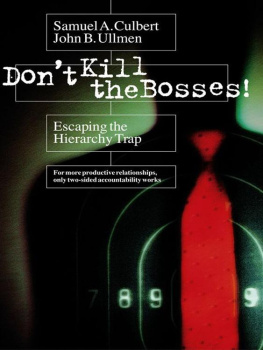
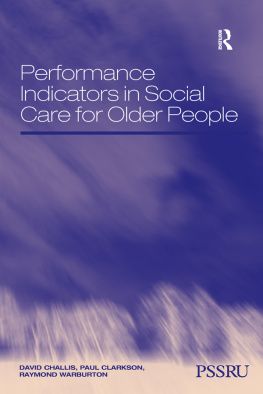
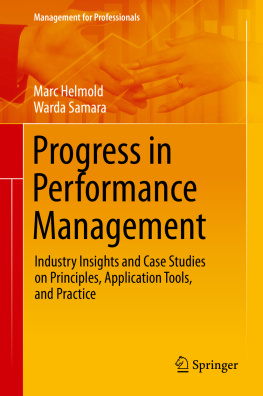
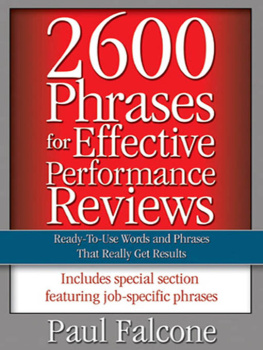
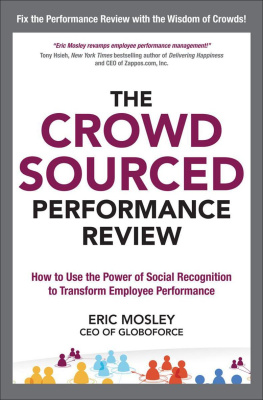
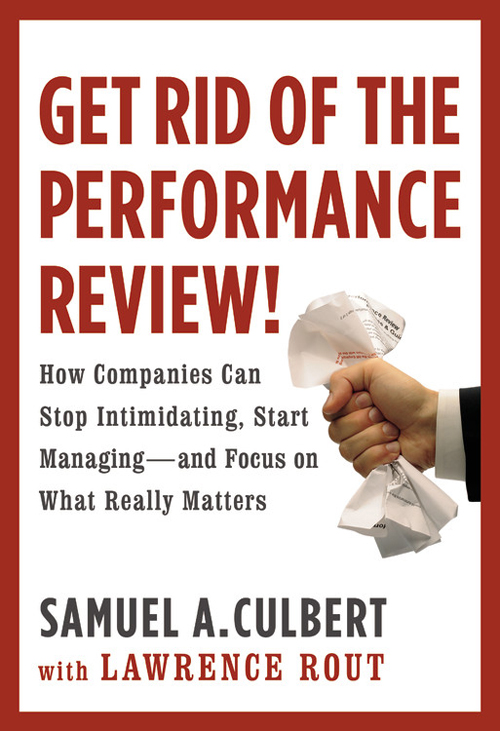
 t: Straight-Talk at Work
t: Straight-Talk at Work